I think, when you work in food, it gives you this very socially acceptable place to put your obsession. And when I made it my career, the more I obsessed, the more I succeeded—the more I was rewarded and validated.
You're listening to Burnt Toast. This is the podcast where we talk about diet culture, fatphobia, parenting, and health. I'm Virginia Sole-Smith and I also write the Burnt Toast newsletter.
Today I am thrilled to be chatting with Julia Turshen. Julia is a New York Times best-selling cookbook author. Her latest book is Simply Julia. She’s written for multiple publications, including the New York Times, Washington Post, Vogue, and more. She is the founder of Equity at the Table, an inclusive digital directory of women and nonbinary individuals in food. And she’s the host and producer of the podcast, Keep Calm and Cook On, which is where I think a lot of you found me. Julia also sits on the kitchen cabinet advisory board for the Smithsonian’s National Museum of American History and is a member of God’s Love We Deliver Culinary Council. She lives in the Hudson Valley, about an hour from me, with her spouse Grace and their pets. And she teaches live cooking classes every Sunday afternoon.
I asked Julia to come on the podcast because I wanted to talk about a presentation she recently gave at the Culinary Institute of America about fatphobia and diet culture in the food industry. But of course we get into so much more than just this presentation. We talk a lot about perfectionism. We talk about eating disorder recovery. We talk about rejecting expectations in how we cook and eat. And why that is particularly challenging for people who work in food, but also those of us who work in media and publishing in general. It’s a really great conversation. I’m so excited for you to hear it.
Episode 56 Transcript
Virginia
I am a huge fan of your work. I know my listeners are a huge fan of yours. Today, I wanted you to come on specifically to talk about this talk you just did at the Culinary Institute. Because when I saw you post about it on Instagram, I just thought yes. There are so many dots that need to be connected between fatphobia and the food industry. So for starters, I would just love to hear you know, how did this come about? Were they open to having this conversation?
Julia
Great question. This conversation was so meaningful and the origins of it are a little bit funny, which is I heard from a professor at the Culinary Institute in like January 2020 asking if I would come speak to the students as part of a speaker series. We set a date for spring 2020. Obviously, that didn’t happen and I kind of forgot about it.
And then a few months ago, I heard from her again, re-inviting me to campus. It was a very surreal email chain to look through. Our last emails were just like, “good luck,” like, “hold on tight.” And so when she re-invited me, I realized that there was an opportunity to speak to this group of students who are all—for the most part, not exclusively—really young. A lot of them are just out of high school and I thought this would be a really great opportunity to do what you said, to connect some of the dots between fatphobia and the food industry. Because I think it’s incredibly prevalent, in a very interesting and very kind of sticky way in the food industry.
My own life has changed a lot in the few years and a big part of that is just rejecting diet culture. And taking accountability for how I participated in it, realizing just how much I struggled in it, which is sort of clearer to see when you’re a little bit more out of it. So I thought this was the thing that felt most important to me right now. And if I was going to accept this very kind invitation, I wanted to talk about the thing that felt most important to me and the thing that I thought could potentially be really helpful for the students.
So the original topic, which we talked about years ago was like a broader topic, like how food can help build community, which it absolutely can. That’s super important. I’m happy to talk about that. But this just felt a little bit more pressing to me right now. So I replied to their email and basically said what I just said to you. And honestly, there was no pushback. She was like, “We haven’t had anyone talk about this and we would welcome it.” And for that, I’m really grateful. I felt a little bit surprised. I was sort of ready to make my argument for why this was important, but I didn’t have to, which was awesome.
Virginia
I do often find—and I’m sure you’re experiencing this as well—once you bring up this topic, there’s often a little bit of a sigh of relief. Where other people are like, “Yes. Can we talk about that?” You’re naming something that they’ve already been thinking about.
Julia
I think so. I mean, I don’t know the inner workings of the CIA—meaning the Culinary Institute. I definitely don’t know the inner workings of the other CIA! But there were two professors I was in touch with who I will just name because they were great to work with: Dr. Willa Zhen and Dr. Anne Henry. I don’t know the CIA very well, but it strikes me as a pretty conservative institution. So I was ready to defend what I think was a pretty critical talk. But yeah, no one asked to see any notes or anything and I just figured if they’re not asking, I’m not gonna volunteer it and so yeah, that’s how that went.
Virginia
In the talk, you articulate something that I have certainly noticed anecdotally for years. It’s this thing where people who work in food and/or are obsessed with food more recreationally, are often also struggling with food. So let’s break that down.
Julia
For me personally, I had what I thought was a weird relationship to food for my entire life. It’s what I now understand to be a decades long eating disorder. I didn’t quite have the vocabulary to express that at the time. And that developed for a number of reasons. A few include the water we all swim in, just the diet culture we all live in, a lot to do with my upbringing, a lot to do with what was modeled by a lot of adults in my life. But it was very much reinforced by the fact that I have spent my whole professional life working in food, specifically cookbooks. I’ve made my career out of measuring food down to like the teaspoon. It’s about having the sense of control over food, like here’s how you make this thing. Here’s a recipe. I think a lot of what I was seeking in my life, as someone who’s lived with an eating disorder for a long time, was just control. And my career as a cookbook author offered that to me.
I’ve been thinking so much about that, especially as I, for the first time in my adult life, have taken a step back from working on cookbooks. Just thinking about what that was all about. The more I do that, and the more I talk to other people, the more I see exactly what you’re saying. Just how prevalent this is, and how it shows up in so many ways. Because the food industry—that’s a huge umbrella term, there’s so many industries within it. There’s the restaurant industry, there’s the cookbook industry, there’s just food media at large, there’s farming, agriculture, all the things that go into food. And, you know, eating disorders, disordered eating, fatphobia, anti-fat bias, this stuff is everywhere and it definitely shows up for people who work in food. Because I think when you work in food, it gives you this very socially acceptable place to put your obsession. Like when I made it my career, the more I obsessed, the more I succeeded, the more I was rewarded and validated, which is really confusing, and really tricky, especially when so much of this just really like harmful stuff goes unspoken.
I wouldn’t be able to be having the conversation I’m having with you if I didn’t talk to anyone about this stuff. I needed to open up to people about it and talk about it in order to get through it. So I think those conversations just don’t really happen. It’s this just unacknowledged thing.
Virginia
It’s making me think about lifestyle and food media, where there’s so much pressure to execute these really sort of perfectionistic images of what meals are supposed to be. Of course, just that the pressure to do that is going to feed into the eating disorder, but then also the sort of praise and the success you get from doing that.
Julia
Whether it’s lifestyle magazines, cookbooks, or social media—so many people consume this media, but it’s not held to the same kind of journalistic standards or rigor as other types of media. Especially types of media that include things about people’s health and their bodies and the things that we put into our bodies. All of this information is shared in this anything kind of goes way. I enjoy the freedom of expression, but I think there’s also something pretty like dangerous about that. The stuff doesn’t get fact checked. I’m not just talking about someone’s Instagram posts, like big national publications will often publish things that are false. Because things about food, things about “lifestyle” are seen as like not really counting. They’re not serious, they’re not real. So a lot gets just kind of slipped in and ends up really hurting people. Talking about like, “oh, eat this thing because it’s better for you.” It’s like, better for who? What does that mean?
Virginia
Yeah, better how? Certainly you see this in how recipes are tagged or marketed, you know, like “sugar free” or “lower sugar,” these buzzwords that don’t have specific meanings and are just resting on a premise that nobody’s questioning, that, obviously, you should only eat in order to pursue or maintain thinness, and thinness equals health.
Did you feel, earlier on in your career or at various points in your career, like you had to participate in that? How did you navigate that? Especially prior to where you are now, doing all this hard work?
Julia
I appreciate you asking because I think a big part of the work I’m doing now, both professionally and personally, is just holding myself accountable for work I’ve done in the past. So, I feel like the way you phrase that—did I feel like I had to do that?—I think that’s generous of you to phrase it that way, because I mean, I absolutely participated in diet culture and in putting it into food media. And I did that not because I felt like I had to, but because I don’t think I knew there was another choice. I was so in it that I just I didn’t know there was an alternative. So I wasn’t doing it in spite of knowing there were other options. It was all I knew.
Again, it’s what I was raised in, it was what I was surrounded by. But I also take total responsibility for not questioning those systems. And I think a lot of that work, just to be quite frank, I think it caused harm, for myself included. So I think for me, the question is not so much did I feel like I had to do it? I think it’s more like, how did I realize there was another option?
Virginia
Right, right. Well, you’re talking to someone who wrote diet stories for women’s media. We’re all trying to take accountability for previous harm. What was the turning point for you? When did you start to connect these dots?
Julia
It was a build up of many moments. And I would say, the biggest turning point that inspired all those small moments was meeting Grace, who I am now so happily married to. Grace and I fell in love nearly a decade ago and Grace was in a relationship with someone who hated her body. That was me. And I think that was really challenging. Grace has spoken about the following openly, so totally cool to share—but Grace has a history of having a pretty challenging eating disorder. I don’t know why I gave it that adjective—I think all eating disorders are challenging
I can’t speak for Grace, but I think I came into Grace’s life as a positive thing, but also as a huge trigger. And that just sucked. And it was a lot for us to work through. Because again, I just didn’t see an alternative. And for a really, really long time, Grace just kept telling me that there was a version of my life that was possible, where I didn’t hate my body. It just took me a while to actually believe that. And then to work towards that. I would say that was like my biggest turning point.
The rest has been a lot of small moments. Some of which include, honestly, just feeling really tired. Having any type of eating disorder, it’s exhausting to try and just have that much control over something you ultimately don’t have that much control over. It was exhausting for me to spend that much mental and physical energy trying to change the size of my body. I got to a point where honestly I was just really sleepy and just wanted to be a bit more awake, I guess. I mean, there’s a million little details, but I think the biggest turning point was really Grace and just that encouragement, and also having that incredibly safe and supportive, just partner and home and kind of place to land because I think navigating this stuff is really hard. And I mean, it’s definitely one of the hardest things I’ve done. For me, a big thing is I get so angry and sad when I think about how much time I spent when I could have been doing so many other things, including taking a nap or creating something. I think about how much creative work is lost to all sorts of mental health struggles that aren’t supported, including eating disorders. It just makes me so sad. Like I think about how many songs we’ll never hear, that kind of thing.
Virginia
I think about that, too. I think about books not getting written and all sorts of things.
I also want to shout out the episode you did of your podcast a few months back with Grace, where you talked about all of this together. It is the most beautiful conversation. I think I cried three or four times listening to it. Obviously, the relationship you have is beautiful, but the compassion that they showed for you, the way that you were able to talk. It’s just a master class in communication with a partner, even above and beyond the topic. It was really special to hear because it gives you such a sense of what’s possible with recovery. I think for folks who are earlier in the recovery journey, you know, it can feel like, well, I’ll never get there, or what does that even look like? What would it even look like not to be active in my eating disorder? Because you haven’t done it and you can’t imagine that. And so, yeah, I loved that conversation.
Julia
Thank you. I appreciate that. It was really great to have that conversation and be able to share it.
Virginia
I want to talk a little more about perfectionism and also urgency. These were two big themes in the talk you did for the Culinary Institute. And it’s also something we talked about quite a bit when I was on your podcast. I like how we’re doing this crossover appearance, like a 90s sitcom. This week the Buffy and Angel characters are in each other’s episodes! Anyway. But we talked about the intersection of diet culture, and workaholism. You had some specific examples in the talk about how these themes show up in the food world that I just thought would be really interesting to talk more about.
Julia
I love talking about perfectionism because I definitely describe myself as a recovering perfectionist. I wouldn’t say I’m on the other side of it. It’s something I have to just keep working through. This also ties into your last question, kind of like the turning point moment. For me, understanding that diet culture comes under the umbrella of white supremacy and comes under the umbrella of patriarchy and capitalism, that has also been a really helpful turning point for me. Realizing that it’s a system. It’s not me, it’s not personal. It’s not that there’s something particularly wrong with me in any direction. It’s that my experiences are influenced by various systems. When you change who the bad guy is, it’s just a much more helpful way of seeing things. Understanding that my difficulty with my body image throughout my life, my struggles with an eating disorder—understanding that these things were symptoms of much bigger problems that aren’t so personal, helps me move my energy towards understanding that, as opposed to trying to change myself.
So perfectionism comes under this to me. Perfectionism, I think is, one of the most annoying parts of white supremacy. It seeps in in all these different ways. And we see it in our personal lives. The social media example, like whether it’s a photograph of something you ate, or it’s a photograph of someone’s vacation or the car they’re driving, whatever it might be. This idea that there is more to strive for. This constant striving, striving, striving, and feeling like there’s only room for one person at the top. That scarcity mentality, that is perfectionism. Feeling like there’s a right way to do anything is perfectionism. I see perfectionism as a tool of white supremacy to kind of bolster itself. And it’s a definitely a big tool of fatphobia of anti-fat bias and of eating disorders. Eating disorders are such a clear example of perfectionism, like striving to have a certain weight, a certain body, a certain look, whatever it might be, and doing things to achieve that that are incredibly harmful.
Virginia
You had some interesting examples of perfectionism in the food industry.
Julia
I think anytime in like a food magazine or in a cookbook—again, I’m guilty of this—where you see anything labeled as “the best whatever.”
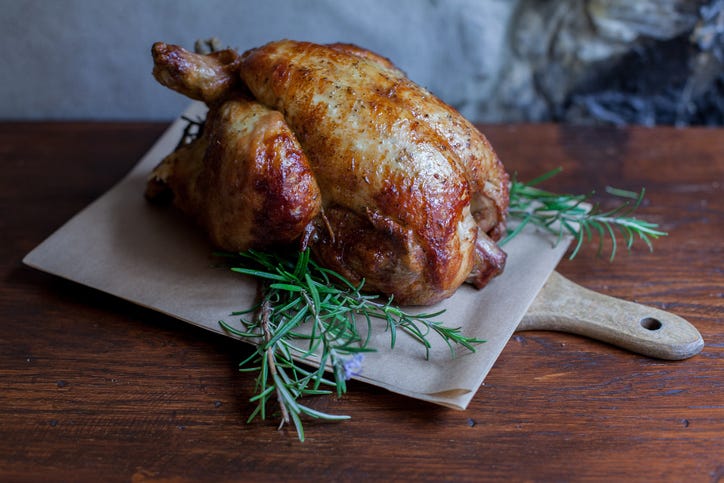
Virginia
“The Best Roast Chicken.”
Julia
Exactly. The idea that there’s a best way to roast a chicken. They’re in classes where they’re most likely being taught this is the best way to do this, this is the “right” way to do this, this is the proper way to do this. There are a lot of ways to cook a chicken. A lot of them are really good. I think it’s helpful to think about that. There are people all over the world putting a chicken or any thing they’re going to eat into a hot oven, pulling it out a little bit later. And they’re gonna have a good meal. It just doesn’t have to be this complicated.
Virginia
Often “best” is equal to hardest to execute, right? Like, this has the most steps, or it has the most components from scratch.
Julia
This idea that everything has to be made from scratch or be homemade to be better, to be best. I think we see it in the restaurant industry, just in the way many professional kitchens are structured. I feel like a lot of us have been watching The Bear, and just that brigade system that’s in place. There’s one person at the top. It’s a hierarchical system. Perfectionism comes in everywhere, you know? There’s a perfect way to make that sandwich. There’s a perfect way to make those donuts. All of that is really seductive. You feel like you have a purpose when you’re striving for perfection. And in a world that can feel really challenging, it’s really seductive to feel like there’s a purpose there. But I think when we make our purpose perfectionism, we’re just forever disappointed. And that just sucks.
Virginia
This is such a hard concept for me also, as a recovering perfectionist. Because a part of me, even as you’re talking, is saying, but shouldn’t we want to work hard? I don’t even know what voice that is. Is it my dad? Saying like, but shouldn’t we want to do the best we can at these things? And is that so wrong? But I’m also aware, there’s this cost that comes with it.
Julia
I think it’s such a “yes, and…” I enjoy working hard. I enjoy challenging myself, whether it’s physically or mentally. I do a lot of writing. I also have had experiences farming. I think working really hard can feel really good. I think, at least for me personally, it can make me really happy. It’s just understanding what’s the goal of that? What am I trying to get out of that? What am I trying to prove with that? Asking myself these types of questions is really helpful. And again, just following those thoughts to understand where they’re coming from helps me see those systems. Like in your question about perfectionism in the restaurant industry, I think another just great example that many people can identify with just as customers is how, at least in American restaurants, how tipping continues to be the norm.
Virginia
Great example.
Julia
Understanding that the American restaurant system is rooted in slavery. It’s rooted in unpaid labor. It’s rooted in people not making any money for the work they’re doing. So tipping comes in, in this way that’s actually incredibly terrible. I’m not an expert on this by any means, but I feel like laws are bent to allow people to work incredibly hard and not even make minimum wage because they’re entitled to tips, which is just this totally unstable way of living.
It also causes all sorts of tension within communities that work together. Not everyone in the restaurant is necessarily entitled to those same tips. It allows the customer to have this power dynamic that is also just, just terrible. And the way people treat people who work in restaurants can be just so awful. And you know, you’re holding 20 percent, often less, above people in this way that is just really mean and doesn’t really serve anyone.
Virginia
Yeah, it trains us to think that we’re allowed to grade people’s performance. Even people who I think of being super liberal, I’ll be surprised when I go to dinner with them, how harsh they are if the service isn’t absolutely impeccable. They’ll say things like, “well, they lost their tip.” Do you not realize that you’re being so Marie Antoinette? It’s this weird class power thing that you are deciding whether someone’s worthy. It’s creepy.
Julia
It’s archaic.
Virginia
Yeah. Bottom line: if you go to restaurants, you need to tip until we actually pay restaurant workers a fair wage. You just have to tip well, I don’t care how bad the service was. It’s the cost of being there.
Julia
That’s their salary.
Virginia
It’s completely wild.
I’m also thinking how all of this perfectionism and urgency stuff gets in the way of enjoying food for those of us who are just home cooks. Like, this just makes me think about all the pressure I’ve put on myself over the years for dinner parties to be executed in a certain way, or even just regular dinner with my family to be executed in a certain way. And how much letting go of that is important. And understanding when it’s like, oh, it’s a Sunday, and I have time to mess around with the soup recipe and that seems like a fun way to spend the afternoon, even if it becomes labor intensive, versus I am holding myself to some artificial standard about what what our food needs to look like on a daily basis.
Julia
I think one of the ways that is really harmful to all of us is that it makes it harder to actually connect with the people you’re eating with and to enjoy the company you’ve had in your home. Or, for you, if it’s just with your kids, your husband, whatever it is. Because I think when we’re holding ourselves to these standards, where we have this idea of perfectionism and urgency in our home cooking, when we’re reaching for a standard that is just impossible, and then we’re thinking about all these ways we could have done it better or things will change next time. Every time someone apologizes for not getting it perfect, you are just creating more and more disconnection. It’s another chance to just feel isolated, which again, to me is just a tool of these horrific systems.
Okay, my dogs are going crazy.
Virginia
They’re just joining you.
Julia
They hate perfectionism.
Virginia
They want everyone to tip. It’s totally fine.
Julia
I imagine there’s probably a package being left on our door. Also I’m like a floor away and the door is closed.
Virginia
They’re just so good at making themselves heard! There’s a lesson there. They’re unafraid to take up space.
I also was curious to talk a little bit about what changes you could see being made in the food industry, whether that’s restaurants or grocery stores or food media, like cookbooks? Since I know that’s sort of where more of where you’ve spent your time, what would it look like if we made these spaces fat positive and anti-diet? What would happen?
Julia
I have a few ideas. I’m curious, too, what you think. But I think in terms of anything that has writing on it, so cookbooks, but also restaurant menus, advertisements for all these things. I think just being aware of our language, because language has a really powerful effect on culture. So just being mindful of the words we use to describe food. When we describe any type of food as like “junk,” or “garbage,” or on the flip side of that, but equally, in my opinion, terrible, when we describe food as “clean,” or any of that kind of stuff. When we’re adding these types of moralizing adjectives to what people are eating, I think it would be great if we could stop doing that. There’s a lot of ways, honestly, a lot of very easy ways to change stuff. Just changing that word would make a really big difference or just leaving the word out. I think also pseudo medical terms that don’t really mean anything. For example: Detox, that kind of thing. I think getting rid of that would be awesome.
And I think physical spaces where food is either like purchased or consumed—and again, I’m not an expert on this. A lot of people are paying more attention to this than I do. But in my observer opinion, I think a lot of decisions are made that makes spaces, physical spaces, incredibly fatphobic. And I think those decisions are made, really from a place of just capitalism. I don’t know that they’re made out of just hatred for fat people. But I think the effect they have on people—and not just fat people, but also people with physical disabilities—is just really, really harmful. Things like squeezing as many tables and chairs into a restaurant as possible. Like, I get it. You’re trying to get as many customers as possible. But you’re making this space just so incredibly inaccessible.
A lot of the issues that come up in grocery stores have to do, again, with with words and language and marketing, and how food is advertised. And where things are displayed. And, if I could just wave my magic wand, I would also be able to change the prices on things and make things more affordable, but also be able to pay the people who produce the food in the first place a lot better and all that. It’s just a huge, huge topic.
Virginia
One thing I think about a lot in grocery stores is how we’ve all heard that diet culture advice of “only shop the perimeter and avoid the aisles where all the processed food is.” I would just love someone to reorganize the grocery store and put the fresh fruit in the middle and the other stuff on the perimeter. The way we talk about eating has trained us to think of the grocery store as having good and bad aisles.
Julia
Even in general like the way we think about things like processed food and frozen food, stuff that’s incredibly helpful for so many people for a variety of reasons. Just not demonizing any of these choices.
Virginia
And recognizing they can play a really useful role in people’s lives. They can also just be delicious. I am so glad you did this talk at that place. I feel the way I feel whenever I hear someone doing this kind of thing in a med school, where I’m like, this is what we need. We need this next generation of food industry people, of doctors, of health care providers, thinking about this differently, like, you know, and starting to challenge this because that’s what hasn’t happened for so long.
Julia
I can’t remember like the study off the top my head, but I remember learning in Aubrey Gordon’s book, there was something about with medical students. Like, there was some study that I think it was like a 15 minute talk about this, like the effect that had just to let people know about this, totally changed the way they view their patients and interact with them. And you think about how many hours medical school is, how many years. And so you think like, if someone takes 15 minutes to just break this down in a way that is understandable and maybe not judgmental, not moralizing, like the impact that can have. So yeah, I think we need to do this in every industry, because it happens everywhere.
Virginia
It really does. Journalism for sure needs this kind of anti-bias training. I see this all the time in science and health journalism, where again, the premise was not questioned. You went into the reporting on the study or the whatever with all these assumptions intact. And so of course, the headline you’re giving us is just reiterating fatphobia all over again. So I agree. We need it everywhere. And I am grateful that you are doing the work. I’m grateful to be doing the work with you.
Julia
I mean, ditto. Totally Ditto.
Butter for Your Burnt Toast
Julia
I will just have to shout out the Body Liberation Hiking Club. It was formerly called the Plus Size Hikers of the Hudson Valley. Alexa, who’s wonderful, who runs the group, recently changed the name again to just make that umbrella a little bit bigger. I know that everyone listening to your podcast probably doesn’t necessarily live in the Hudson Valley, as both you and I do. So this is a local group. It’s awesome. You can find them on Instagram and Facebook. We go for hikes all the time, and it’s so non-judgmental, come as you are. We go slowly. It’s great. It’s changed my life.
But I also wanted to mention it because even if you can’t come to this particular group—groups like this exist. And if you live somewhere where you can’t find that group, you can just start that group. You can just like put it up on social media or whatever, tell your book club, the PTA, I don’t know, wherever people find out about things. And I just really encourage people to do whatever version of that makes sense. I mean, being outside and hiking isn’t for everyone. But it’s available for anyone who wants and being with this group has been just one of the most positive additions to my life and has helped me in all the things we’re talking about today. So I just definitely have to shout them out.
Virginia
I’m so here for this. My fall goal is to come on a hike. I follow and I’m always like, “Oh man, I missed another good hike.” Once I get these book revisions done, my fall goal is to come on one of these hikes because it just looks delightful.
Julia
And no rush. No worries. It will be great whenever you join me. I always bring extra snacks, so if you forget yours, I have some.
Virginia
The odds of me forgetting to pack a snack are like… I mean, I was thinking of our conversations about unapologetic hunger. I don’t know if you saw that meme going around that was like, I don’t understand people who forget to eat, because I immediately forget my own name.

Julia
That’s just never happened to me. I don’t get it.
Virginia
Dan sent it to me because it was something like “I’m turning on family members.” And that’s what happens if we’re 30 minutes past dinner time. So yeah, I remember snacks. Always have extra snacks. It’s very important. I love that.
And speaking of snacks, my Butter this week is the tip you gave me about when you have a party and you are serving a cheese plate. And you get sad because people don’t eat the cheese. And a lot of times it’s because of diet culture reasons that they don’t eat the cheese. But a practical way to make it easier is to cut up the cheese for the cheese plate. And I did this for a dinner party we had and then also for my book club last week, and people ate so much more cheese, Julia! I’m so happy.
Julia
I’m so glad! I saw you posted something about that on Instagram. And it just made me smile. Just, just the biggest smile.
Virginia
It is such a good tip.
Julia
It’s simple, right? I believe in big systemic changes and love imagining that. And I also believe so much in the power of these tiny moments, like for example, cutting up the block of cheese instead of just waiting for someone to start because then everyone just enjoys it.
Virginia
Yeah. And it made me realize the reason I wasn’t doing it more often it was totally a perfectionist/diet culture thing of wanting the cheese plate to look like a magazine photo shoot. Like, there’s those very artistic cheese plates you see where they don’t cut up the cheese because it’s more—I don’t even know what the aesthetic is that I was striving for. But I was like, this is so dumb.
Julia
Sliced cheese can be beautiful. Crumbled cheese can be beautiful.
Virginia
It can absolutely be beautiful. There was no reason to not be cutting up the cheese other than I had some arbitrary aesthetic I was applying to my cheese platter that I have released myself from.
Julia
Yes, I’m so thrilled you’ve broken free of this. Life is what happens next to the Instagram picture.
Virginia
It really is. It was also this ripple effect, where I started thinking about a lot of the ways I let perfectionism and these sort of aesthetic goals get in the way of enjoying food experiences. I was like, oh, it’s okay, if I don’t have everything laid out the second people arrive. We could go down a lot of rabbit holes of where these rules about entertaining had started to take up space in my brain. Obviously then with COVID, there was a long period of no entertaining now that we’re doing more—all outdoors I should note—I’ve been realizing, like coming back to it. I can let go of the pieces of it that weren’t fun for me in the past because I was making it too hard.
Julia
Totally. Friday night, my parents came to spend the night and—we all took COVID tests, I just want to be clear—I was making dinner. I usually in the past have always, whenever anyone comes to our house, I’ve always had everything ready when they come. It’s been way less than the past few years, but now that I’m sort of getting back into it with family and stuff, I didn’t have everything ready when they came. Like I knew what I was gonna make, but I was doing other stuff. And I was like, they’re coming here at four o’clock. Dinner doesn’t need to be ready at four o’clock. I mean we’re early birds, but, you know. So I was making dinner while they were here, which was actually really fun. And then I had stuff in the mixing bowls I had mixed it in, that kind of thing. And I made these ribs and I had them on the sheet pan. I brought them from the grill on. And then I took out all these serving platters. And I was about to decant everything. And then I was like, What are we doing? You don’t need to wash double the dishes, right? We don’t need to take a photograph of this to put anywhere. I’m just having dinner with my family. I just threw the sheet pan on the table. You know, the metal mixing bowl. And it was great. It was just like this kind of moment of like, why am I making more work? Why am I making more labor? Like, let’s just enjoy this food.
Virginia
I have to say shout out to Dan, because he has been anti-serving bowls for all of our relationship. He will be feeling very seen by that. He’s always like, can’t you just put it out? And you know, there are times where I just can’t. I’m like, No, I’m sorry. I need it to be pretty and I’m gonna use serving bowls.
Julia
We can have both.
Virginia
It’s nice to recognize when this is not actually something you care about and you can just let it go.
Julia
Totally.
Virginia
Julia, thank you so much. I could talk to you for many more hours, but we should wrap up. Well, we’ll do it again some time. Just to remind folks where they can find you and support your work.
Julia
Sure. My Instagram handle is just my last name, @Turshen. My website is just my name, JuliaTurshen.com. That has everything about my cookbooks, my cooking classes I teach, which I do every Sunday. All that kind of stuff, my podcasts, everything is there.
Virginia
Amazing. Thank you so much!
The Burnt Toast Podcast is produced and hosted by me, Virginia Sole-Smith. You can follow me on Instagram or Twitter.
Burnt Toast transcripts and essays are edited and formatted by Corinne Fay, who runs @SellTradePlus, an Instagram account where you can buy and sell plus size clothing.
The Burnt Toast logo is by Deanna Lowe.
Our theme music is by Jeff Bailey and Chris Maxwell.
Tommy Harron is our audio engineer.
Thanks for listening and for supporting independent anti-diet journalism.

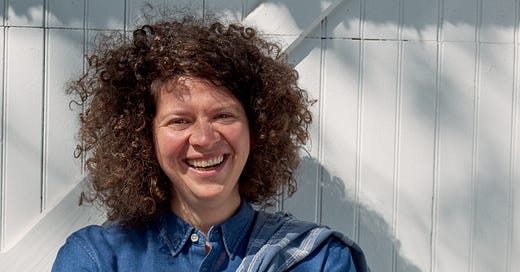
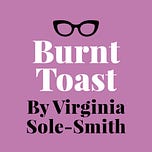



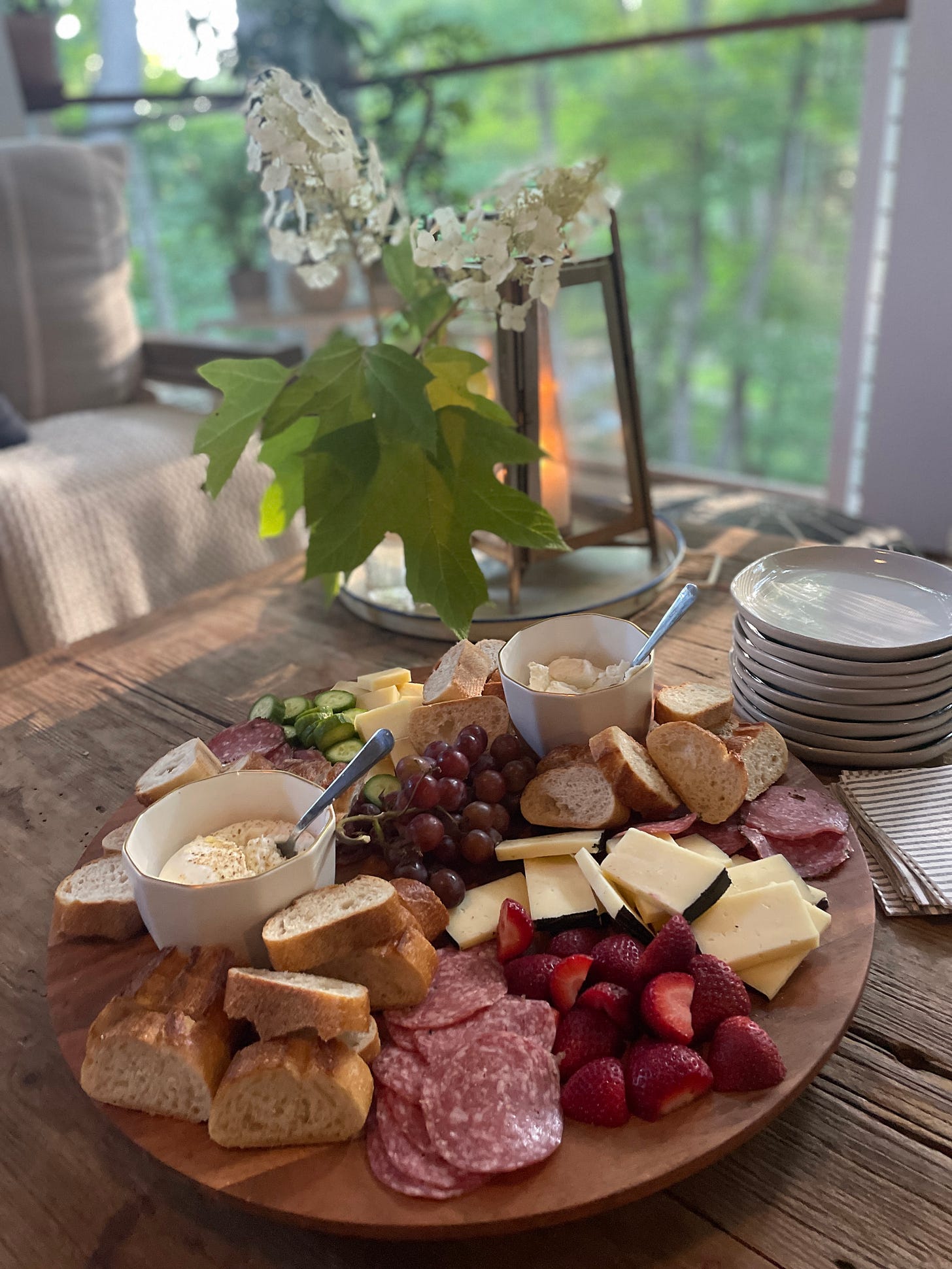












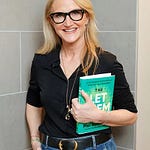
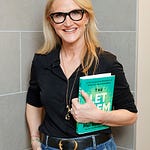
I’m Team Tupperware As Serveware. Once we’re done eating, lids go on containers and then straight into the fridge. (Technically we don’t use Tupperware -- does anyone anymore? -- we just don’t like doing more dishes!)
I really enjoyed this episode. Thank you, Julia!!
Ahaha yes I think what I have is a mix of Pyrex and those Glad containers the grocery store sells, which I was probably supposed to throw out five years ago but here we are.
Me too. I did pick up a nice set of plastic nesting bowls with matching lids a couple of years ago which satisfies me on both an aesthetic and convenience level.
I'm with you on this! We bought some nice glass tupperware (food containers? It's not technically tupperware as you say lol). Doubles as a mixing/serving bowl then can go straight to the fridge.
Loved this interview!!! I'll admit that I binge watched the first season of The Bear on a Saturday last month (it really is easy to do!). I will say that after working as a server, that show was triggering on many levels, and definitely realistic for how it is in a working kitchen. We never had anyone get stabbed, but someone did wave a knife in someone else's face once as a threat. I also LOVE Virginia's cheese plate, and wish I was in your book club! :D
You can be in the Burnt Toast Book Club! Virtual so you have to cut up your own cheese but still so fun!
That's right, I forgot about that! And I don't have to "dress up" for that one! ;)
Loved this episode and have also enjoyed several of Julia’s other interviews!
I work as a civil engineer, and the cheese board story made me realize anew how different the male experience is - when I go to technical society talks, and there’s a charcuterie board out; that thing gets absolutely ravaged within minutes! You gotta be quick when there’s a bunch of young (and older) men around! I know men also have weird diet culture stuff (keto and gains and huel dear god no); but cheese modesty is not nearly as much a thing.
Ahaha, yes, "cheese modesty" is definitely a "socialized female" phenomenon. SIGH.
Thank you so much for this beautiful conversation with Julia! I just listened to her body episode with Grace, and I also found it very moving. I’m bi and it really struck a chord with me.
Oh so glad! I loved their conversation so much.
This was a great read. I would love it if cookbook authors/recipe writers in particular changed the language, as Julie suggests. I get really tired of a baking recipe being described as an "indulgence" or "naughty", or some other recipe described as that increasingly meaningless "healthy". Tell me how to make the food, not how to think about it.
Amen